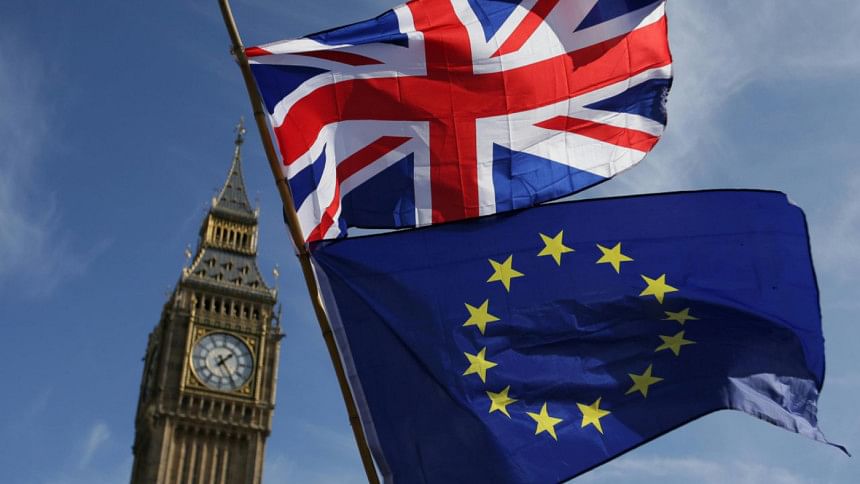Europe lives on

Paris – Brexit is a disaster for the United Kingdom. Given the risk that it will now lose Scotland and Northern Ireland to secession, the country seems to have accepted the idea of Great Britain turning back into "Little England." Britain is that rare lion that chooses to become as small as a mouse.
To be sure, saving the English realm is all the Brexiteers ever cared about. But what sort of realm has a prime minister who lies to its queen, as Boris Johnson did when he suspended Parliament last year? Through it all, the Brexiteers have exalted the British Empire and Winston Churchill. Yet they have forgotten Karl Marx, an earlier wanderer of the London streets who warned that history eventually repeats itself as farce. With Johnson in power, the UK is governed by a pantomime Churchill. Rather than an exponent of courage, it has the Prince of Cynicism—a scruffy knock-off who adapts his opinions to whatever is politically expedient.
The Brexiteers are now fixated on the "sovereignty" that they have supposedly regained. Yet it is well known that they owe their success in the 2016 referendum to Russian interference and American social-media algorithms. The "Leave" campaign was a saturnalia of cynicism and fake news, led by charlatans who were only too happy to be mistaken for the country's staunchest democrats. It was less a moment of truth than a bad novel come to life.
To be sure, Churchill is said to have told Charles de Gaulle (another transient through London's foggy streets) that England would always prefer the open sea to Europe. But if he were around today, de Gaulle would point out that Johnson's Britain has neither Europe nor the open sea. Instead, it has trade wars, a pseudo-friendship with US President Donald Trump, and mediocre economic prospects in a world increasingly dominated by powers like the United States, China, and the European Union itself.
Still, it is painfully clear that Brexit is a defeat for the idea of Europe—that metaphysical chimera, that geopolitical Harlequin's coat of many colours. To channel Marx once more, Europe is a unique amalgam of German thought (and its demons), French politics (and its spinoffs), and English commerce (and its excesses).
Within the EU, the UK was the modern version of John Stuart Mill and David Hume standing against French grandiloquence, and of Benjamin Disraeli checking continental impulses toward Wagnerian chauvinism. Insofar as the UK represented the sea, it could wash away the provincialism of Paris, Rome, and Vienna. Britain brought the irony of G. K. Chesterton to international negotiations. And it offered a touch of Byronic cosmopolitanism to instill compassion for Greece during its crisis, and solidarity for the wretched of the Earth more generally.
There is a reason why Britain became a safe refuge for the likes of Chateaubriand and Sigmund Freud, and for governments in exile, resistance movements, and refugees. Without the UK, Europe will become more stifling. The continent will still have its Don Quixotes and their splendid dreams, as well as its Sancho Panzas, restraining others' flights of fancy. It will have the ruins of Rome, the splendor of Athens, and the ghost of Kafka. But it will have lost the cradle of liberty.
Let us dispense with the fable that Europe will always come together in times of crisis, as though compelled by some physical law. Why is it assumed that Europe, in its great wisdom, will respond to every authoritarian and populist thrust with an equal and opposite advance of democracy?
Last year, the looming realities of Brexit did nothing to save the European Parliament elections. The outcome ultimate conferred a modicum of legitimacy on would-be democrat-dictators like Hungarian Prime Minister Viktor Orbán and Czech Prime Minister Andrej Babiš. It is safe to say that, without England playing its historical prophylactic role, the epidemic of populism will become more virulent on the continent.
The West has not so much been kidnapped as gone missing. Does this mean that the dream of European unity is over? Does the exodus of a member state obliterate the vision of Victor Hugo and Václav Havel? Does Europe now fit the description of what the great American president Abraham Lincoln called a house divided against itself?
Not necessarily. History is more imaginative than we are. The EU still has the option of keeping Britain close in heart and mind. We can still benefit from our absent partner, by resurrecting the partnership through our actions. We can create a union not of technocrats but of Churchills.
As an unabashed Anglophile, I will continue to dream of a Europe that, fortified by the legacy left behind within its walls, can show fellow feeling for a cherished family member who has departed. We have not lost the culture that gave us the Magna Carta, the cosmopolitanism of Gulliver, and swinging London. We still know the true liberalism of John Locke and Isaiah Berlin, even if the word's meaning has become muddled by lazy thinking.
This true taste of Europe—a blend of freedom and ironic skepticism—is precisely what we need to stare down the truculent faces of democratic-dictatorship. Just recently in Italy, a Swiftian movement called the Sardines rejected slogans and insults in favor of righteous anger and humour. They beat back the populist League party leader, Matteo Salvini, and demonstrated that the exponents of illiberalism are only as strong as we are timid.
Europe is not dead. We fight on—without England, but still with the English.
Bernard-Henri Lévy is one of the founders of the "Nouveaux Philosophes" (New Philosophers) movement.
Copyright: Project Syndicate, 2020.
www.project-syndicate.org
(Exclusive to The Daily Star)

 For all latest news, follow The Daily Star's Google News channel.
For all latest news, follow The Daily Star's Google News channel. 



Comments